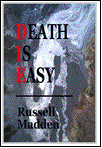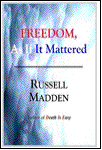 |
 |
|
|
 |
 |
|
|
In his "Rationality as a Source of Conflicts of Interest," Murray Franck raises some provocative issues. Unfortunately, his use of examples that violate the parameters detailed in Rand's essay, "The 'Conflicts' of Men's Interests"; his use of the terms "interests" and "conflict" in their colloquial rather than philosophical senses; his misinterpretations of Rand's points; and his primary reliance on short-term rather than long-term issues left me unconvinced. Given time and space constraints, I can only sketch in my objections here.
Throughout his essay, Franck appeals to an overly broad use of "interests" in a way that equates them with any short-term wants, desires, and/or needs that a (rational) person might have. A person "needs" a job; a woman "needs" a cab either to gain a job or to obtain medical care; a wounded person "needs" a doctor to save his life. Further, his focus on such cases calls to mind those who can only appeal to "emergency" cases to criticize Objectivist ethics.
Despite Franck's rejection of the "malevolent universe" idea ("where disasters are the constant and primary concern" of life, ["Ethics of Emergencies," p. 43], it is those "situations which he is not likely ever to encounter" (ibid., p.43) that he uses to build his case. Indeed, he mischaracterizes Rand's "Benevolent Universe" idea. She never claimed nor implied that the universe "helps" people. All this principle means is that evil and disaster are the exceptions, not the rule; that "success, happiness, achievement are [possible]" (ibid., p. 48). Natural disasters are irrelevant in determining people's metaphysically normal interests. There is no conflict between the Benevolent Universe principle as properly understood and "tidal waves, volcanic eruptions and earthquakes."
(I also imagine Rand might object to Franck's characterization in that same section of her theory of value as "subjective." Values are to be evaluated objectively, even if they are one's own, unique values.)
Rand specifically delimited her argument to a free society and among rational men. Franck often ignores that context. His example of a U.S. citizen interacting with a totalitarian nation is not an example of a free association of individuals. His next example of an evil physician hardly ranks as an exemplar of interactions among rational people. These examples are nothing more than illustrations of a point Rand often made: that fully moral actions are impossible when force and irrationality rule.
As for internal conflicts, while such are obviously important, again, Rand dealt in her essay with conflicts among people, not within oneself. Simply because it is often difficult for an individual to make tough decisions -- simply because costs can be painful -- does not mean that one cannot reach a best decision given a certain context. Franck simply asserts in his example of the woman deciding between husband and child that both are supreme values and thus are in conflict. There is nothing to preclude the woman from deciding that her husband is more important to her and is thus her supreme value.
Indeed, Franck often equates conflict with making difficult choices. While "conflict" might cover such situations in normal conversation, Rand does not use "conflict" in this narrow, colloquial context any more than she uses "selfishness" in the sense that "everybody else does."
Franck's restatement of Rand's claim as "moral men acting morally do not have conflicts of interests" is incorrect and assumes what he has to prove. Moral, rational people -- as Franck continually reminds us -- can make mistakes. Simply because error in identification of one's interests is possible does not mean, however, that in reality their interests (as Rand discussed that term) are in conflict. More information, a longer time frame, or other perspectives might provide the correct answer. But even if the proper interpretation is impossible to learn (due to loss of information, a death, or whatever) that does not mean that such an understanding does not, in principle, exist.
Indeed, Franck sometimes seems to contradict himself, e.g., claiming that "morality is a function of coherence rather than of correspondence" then, in the same paragraph, stating that an immoral action is "one that...fails to correspond to reality's measure of the truly objectively moral action."
Franck objects to the notion of a "philosophically objective value" then claims such requires "virtual omniscience." He also claims that "social harmony and political peace" would, according to Rand, require "a world in which interpersonal conflicts do not exist." However, one can have the former even without the latter...if rights (as Rand and Franck discuss them) are in place. With rights in place and strictly observed, real conflicts (between rational and irrational men) would not be the norm or even a significant factor in a free society. As Rand points out, any such people in conflict would go their own ways; the irrational could not impose their desires on their rational neighbors.
The whole thrust of Franck's argument is that rational people have conflicts in reality and that because of such inherent conflicts, rights are needed and are what create social harmony. In all the examples he cites, rational people must appeal to their ethics (and their extension in a social situation, rights) in deciding how to act in any given situation. Yet an objective ethics provides one and only one correct answer in any given context. If an ethics gave two, mutually exclusive answers in such a context, it would be no valid guide, at all. Franck's belief that conflicts among rational people exist in reality would lead to such a result. Franck's position would result in that "naturally occurring contradiction" which he states does not apply to people's interests (Section II.A). (Also confusing here is his distinction between "order" and "lawfulness." In one sentence he says the laws of nature tend to disorder. In the next, he talks of "ordered nature." Cf also his rejection of "conflicts" as "naturally occurring contradictions" in Sec. II.A with his statement that such conflicts are "metaphysical" in IV.C.)
As for Franck's examples of jobs and romance, Rand covered his objections in her discussion of reality, context, responsibility, and effort. Given more space, I would discuss this in more detail. In lieu of that, I direct readers to her essay, "The 'Conflicts' of Men's Interests."
As Rand said, "A rational man knows that one does not live by means of 'luck,' 'breaks' or favors, that there is no such thing as an 'only chance' or a single opportunity, and that this is guaranteed precisely by the existence of competition. He does not regard any concrete, specific goal or value as irreplaceable. He knows that only persons are irreplaceable -- only those one loves." ("TCMI," p. 55.)..."All of the above applies only to the relationships among rational men and only to a free society." (Ibid, p. 56.)